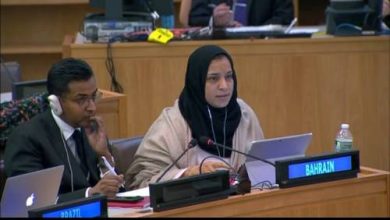Judicial and legal prosecutions crushed freedom of expression in Bahrain

Over the past years, judicial and legal prosecutions have crushed freedom of opinion and expression in Bahrain and increased self-censorship of journalists for fear of the al-Khalifa regime.
Since 2011, the Public Prosecution Office in Bahrain has relied on a number of charges such as “obstructing peace and threatening security”, “inciting hatred against the constitutional system of the kingdom”, “hating a sect of people”, “insulting the Ministry of Interior”, “insulting the judiciary” and others.
The Bahrain Press Association said that these legal and judicial prosecutions contributed to the decline in freedom of opinion, expression, and Bahrain’s press.
It explained that some of these legal texts were passed through the current parliament, which the opposition forces accuse of being subordinate to the government and of being unable to represent the voice of a wide segment of citizens, and demanding that it have full powers.
Those texts were used in particular, against opponents and critics, based on elastic and general definitions that facilitate the process of targeting and retaliation.
According to Human Rights Watch, authorities in Bahrain have cracked down on peaceful expression online and on social media and prosecuted critics.
This created a state of fear and a decline in the opposition voices inside the country and a state of self-monitoring of journalists and civil society organizations working inside Bahrain to avoid arrest, investigation, closure, withdrawal of licenses and restrictions.
Through harassment, arbitrary detention and torture, the government of Bahrain has been able to crush a once vibrant and thriving civil society. What remains are just a few lone voices brave enough to speak out, says Philip Luther, Director of Research and Advocacy for the Middle East and North Africa at Amnesty International.
Journalists face bans, restrictions, or self-censorship of what they write and say, whether through their work in traditional or modern media or their accounts on social media.
While the authorities closed the country’s only independent newspaper Al-Wasat in 2017, only one voice remained inside the country, the Voice of Authority, through five daily newspapers partly owned by members of the ruling family and state radio and television stations.
They all publish and transmit in one single voice, and the journalists working in these institutions adhere to the editorial/political line in exchange for remaining in their jobs without an alternative.
Journalists who lost their journalistic jobs due to dismissal or closure of the workplace or their political affiliations were able to create space in the broader space, the Internet, by creating news accounts that follow local, regional and international news. These platforms monitor events and make money from the account’s commercial advertisements.




